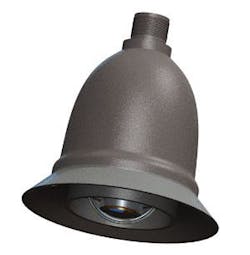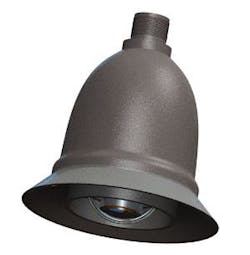Smart camera monitors traffic
For any traffic-monitoring system to recognize the presence of a vehicle at a traffic light, traffic loops buried in the road must detect the presence or absence of a motor vehicle. As each car moves over these loops, the metal body of the car reduces the inductance within the traffic loop that causes a change in its resonant frequency that is then detected by a signal conditioning system and used to switch the status of the traffic lights.
“Unfortunately,” says James Sherrill, CEO of Aldis Corp. (Oak Ridge, TN, USA; www.aldiscorp.com), the 20% per year failure rate of these loops often leads to driver frustration. Worse, many intersections use multiple loops to detect the presence of automobiles. Thus, the $3000—$5000 per-loop cost of replacing a single loop can quickly increase dramatically and pose a danger to motorists and road crews.
To eliminate these drawbacks, Aldis has developed a vision-based traffic-monitoring and control system known as GridSmart to replace loop systems and obsolete capital-intensive central control systems. The GridSmart system uses a 5-Mpixel camera from Lumenera (Ottawa, ON, Canada; www.lumenera.com) coupled to a proprietary and custom-built lens with a 160º field of view (see photo).
Currently in beta tests, prototype of Aldis smart camera is designed to automate traffic control by determining the presence, position, and flow of traffic at intersections.
One of the major obstacles faced by Aldis designers was ensuring that captured images were stable. “With a camera mounted above a traffic intersection,” says Sherrill, “the camera is subject to motion and the captured images must be stabilized.” Rather than unwrap the perspectively distorted image into real-world coordinates, this image stabilization is performed on the camera’s embedded DaVinci processor from Texas Instruments (Dallas, TX, USA; www.ti.com). This reduces the processing overhead and allows other functions such as H.264 image compression to be embedded within the camera.
After objects are compressed, they are transmitted along with time-stamp information to a PC-based host computer over the camera’s Ethernet output. Here several parallel processors track objects within the images such as pedestrians, bicycles, and motor vehicles. As each object is tracked, the software determines what the object is and where it is located. Digital information regarding which lane a particular automobile is in can then be used to control a standard traffic controller with the PC digital I/O interface.
“One of the most important design considerations,” says Sherrill, “was compensating for the range of luminous intensities inherent in outdoor operation.” For example, when a camera was viewing a westbound road at sunset, sunlight could potentially saturate the image sensor. In nighttime conditions, the system must also be able to detect a car’s headlamps as it approaches the intersection.
“By using various sensor arrays, some with a +120-dB dynamic range,” washed-out images in such challenging lighting environments are ameliorated. Furthermore, by embedding a global positioning system (GPS) within the smart camera, the position of the Sun can be calculated at all times and used to aid in tracking. Using the GPS data, windows within the panoramic image can compensate for any particular blooming that may occur within specific parts of the image.
“Because the GridSmart system communicates with existing controllers, any existing infrastructure for powering and supervising lights is retained. Additionally, traffic statistics are available for downloading for use in intersection planning and road management,” says Sherrill. Costing $10,000, the system is still in final development phase, with more than 20 beta sites being deployed for evaluation.

